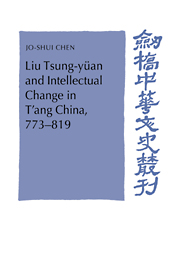Book contents
- Frontmatter
- Contents
- Acknowledgments
- Maps
- Chronology
- Abbreviations
- Introduction
- 1 Literati and thought in the early and middle T'ang
- 2 Liu Tsung-yüan and the circumstances of Ch'ang-an
- 3 805: The abortive reform
- 4 Declaration of principles: Tao and antiquity
- 5 Heaven, the supernatural, and Tao
- 6 Literary theory, canonical studies, and beyond
- 7 Sources of Liu's Confucian thought
- 8 The private sphere
- Conclusion
- Glossary
- Bibliography
- Index
8 - The private sphere
Published online by Cambridge University Press: 07 October 2009
- Frontmatter
- Contents
- Acknowledgments
- Maps
- Chronology
- Abbreviations
- Introduction
- 1 Literati and thought in the early and middle T'ang
- 2 Liu Tsung-yüan and the circumstances of Ch'ang-an
- 3 805: The abortive reform
- 4 Declaration of principles: Tao and antiquity
- 5 Heaven, the supernatural, and Tao
- 6 Literary theory, canonical studies, and beyond
- 7 Sources of Liu's Confucian thought
- 8 The private sphere
- Conclusion
- Glossary
- Bibliography
- Index
Summary
Despite his commitment to government service and his conception of Confucianism as a philosophy of the public good, Liu Tsung-yüan was forced to stay out of public affairs for ten years after his banishment in 805. While pondering and writing on Confucian principles in Yungchou, he had to face the most basic reality in his life: He was de facto a private person, and a lonely one. He had to, and indeed did, try to find ways to bring meaning and contentment to the life of the self. In order to achieve an overall understanding of Liu as a person and as a thinker, it is hence necessary to examine this part of his life. In terms of intellectual history, the significance of this task is twofold. First, it will provide a concrete picture of the inner world of a T'ang Confucian thinker in whose age “Taoism and Buddhism within and Confucianism without” remained a general intellectual premise. Second, since Liu was a prime figure in the mid-T'ang Confucian revival movement and since his views on the Confucian doctrine were more conventional and representative than those of people like Han Yü and Li Ao, a probe into his internal experience should be able to shed further light on the nature of this movement.
A Confucian sense of mission
Liu Tsung-yüan's spiritual life was not just full of self-preoccupation. His concern for the populace and his desire to serve society were deeply rooted in his inner being.
- Type
- Chapter
- Information
- Liu Tsung-yüan and Intellectual Change in T'ang China, 773–819 , pp. 163 - 187Publisher: Cambridge University PressPrint publication year: 1992

